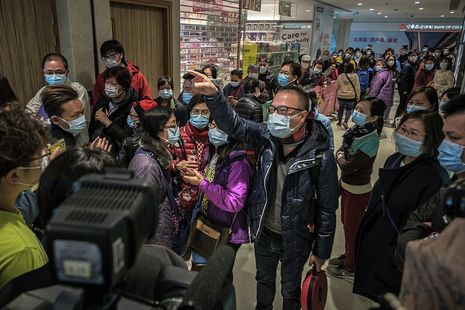Changing cultural practices in the midst of a pandemic
Hannah Lin discusses face masks and the wider impact of cultural differences on policy-making in a coronavirus-stricken world

In late February, before it was clear that the coronavirus would become a global pandemic, my bedder, a Chinese native, began wearing a mask and told me I ‘really should be wearing one too’. Her approach to combating the virus was completely different to mine; I hadn’t considered a mask at all and until recently, it seemed to me like no-one else wore one either.
As a second-generation Chinese immigrant growing up in the UK, watching commonplace Asian practices slowly assimilate into Western society has been thought-provoking. For a long time in the West, masks have symbolised sickness, vulnerability and paranoia, and many mask-wearing Asians in Europe and North America have been targeted by racial abuse. In contrast, mask-wearing in Asia was already prevalent and has now become a societal expectation. Understanding why cultures have contrasting attitudes when it comes to masks and other control measures is crucial in guiding public health policy.
"Apart from preventing disease transmission, masks also act as a sign of social solidarity."
Masks as social solidarity
In the absence of a single clear message on whether to wear a mask or not, people tend to default back to what makes them feel safest. In numerous Asian countries, this means wearing a mask. But for many in the West, wearing a mask may seem more like a loss of individual freedom than a preventative measure. There is a reluctance in accepting mask-wearing as part of the ‘new normal’ whilst in Asia, this is not new or unfamiliar at all. Yet we know that the virus is dispersed in droplets, and experiments show that the spread of droplets is significantly decreased by a simple cloth mask. By failing to tackle cultural barriers to mask-wearing in Western society, we may have missed an opportunity to control the spread of infection. Mask-wearing is now starting to creep into UK policy, but many argue it is too late.
Apart from preventing disease transmission, masks also act as a sign of social solidarity. Sociologist Peter Baehr has written about the emergence of so-called “mask culture” following the 2003 SARS outbreak, describing how mask-wearing evolved from symbolising sickness to “communicat[ing] responsibilities to the social group”. In East Asian countries, where there is often a strong belief in collective responsibility, this is particularly powerful.
The role of East Asian culture
The idea of giving up individual liberties for the benefit of the community has roots in Confucianism, and is deeply embedded in modern East Asian culture. Confucian teachings see the individual as part of a wider collectivist society, where contributing to that society is a major part of a person’s role. It is this sense of duty more than anything else that has driven people to form groups on WeChat so they can shop for others, refrain from panic buying in supermarkets and post boxes of face masks to friends who cannot buy them.
BBC Seoul correspondent Laura Bicker believes it’s this spirit of “we are all in this together” which has gotten South Korea through the initial wave of COVID-19. Her tweets attribute the country’s successful response to actions in the community rather than the commonly held preconception of blindly obeying central authority. People trust in each other to do the right thing, and wearing a mask is just one way of showing that.
The 2003 SARS outbreak also played a role in the speed at which Asian countries adapted once news of the novel coronavirus became widespread. One report suggested that over ninety percent of Hong Kong residents wore masks during the SARS epidemic; in this same period, photographs of a sea of mask-wearers occupied every media story, causing this image to become an iconic representation of a deadly viral epidemic. Behavioural economist Professor Donald Low suggests that widespread mask wearing serves not just as protection, but as a “nudge”, or visual reminder, to maintain hygiene practices, such as washing your hands or not touching your face. The recency of this reality could explain why countries hit hardest by SARS were often the quickest to impose tough lockdown measures.
"Seeing others [wear masks] is an encouraging reminder that people are doing what they can to put an end to this pandemic"
Comparing policies
Still, even if arguments behind the efficacy of face masks are yet to be universally accepted, it is somewhat confusing that healthcare workers wear masks for protection and were worried about low supplies while public health officials in the UK debated the value of using them. Any change in policy regarding masks demanded meticulous scientific evidence, yet it seems this same standard did not apply when implementing the two-metre rule or encouraging the public to sing ‘happy birthday’ twice while washing their hands.
This double standard when it comes to promoting the use of masks likely has more to do with culture than science. As medical anthropologist Christos Lynteris says, epidemics should be viewed not just as “biological events but also as social processes”. This period of isolation has brought attention to many other behavioural differences between cultures. Handshakes, hugging and social gatherings: all of these translate into different ways of managing transmission.
In March, a survey comparing attitudes in different countries analysed by the Winton Centre noted that all countries felt that their governments’ response had ‘not been firm enough’. However, there were disparities in the willingness of individuals to sacrifice certain comforts and trust in government strategy. Germany was most confident in their government; the UK and the US, the least. While much has changed since this data was gathered, it nonetheless shows how ideas and beliefs differ greatly between cultures. These must be taken into account when considering the potential success of an intervention, especially when many of the necessary measures may be unpopular.
Countries around the world have chosen to pursue a diverse range of policies to combat the same disease, and there is much to be learned from viewing the situation from a cultural as well as scientific perspective. I, for one, have finally taken my bedder’s advice by covering my face when I go shopping and seeing others do the same is an encouraging reminder that people are doing what they can to put an end to this pandemic.
 Features / Should I stay or should I go? Cambridge students and alumni reflect on how their memories stay with them15 December 2025
Features / Should I stay or should I go? Cambridge students and alumni reflect on how their memories stay with them15 December 2025 News / Cambridge study finds students learn better with notes than AI13 December 2025
News / Cambridge study finds students learn better with notes than AI13 December 2025 News / Dons warn PM about Vet School closure16 December 2025
News / Dons warn PM about Vet School closure16 December 2025 Comment / The magic of an eight-week term15 December 2025
Comment / The magic of an eight-week term15 December 2025 News / News In Brief: Michaelmas marriages, monogamous mammals, and messaging manipulation15 December 2025
News / News In Brief: Michaelmas marriages, monogamous mammals, and messaging manipulation15 December 2025









